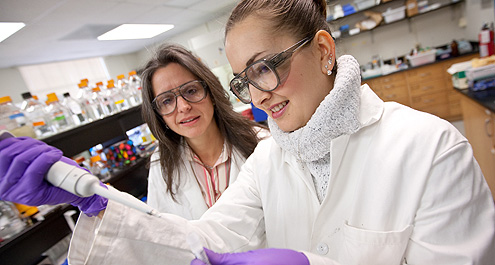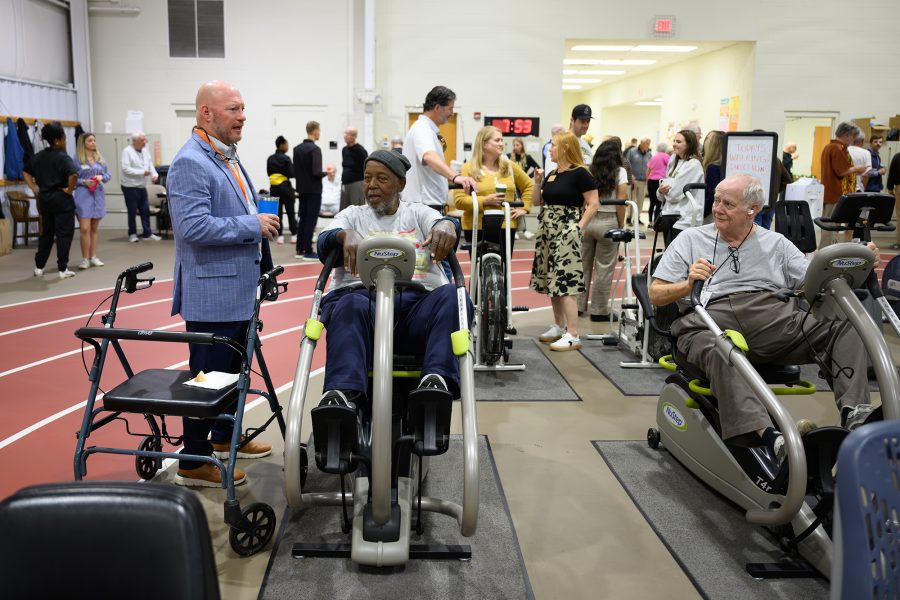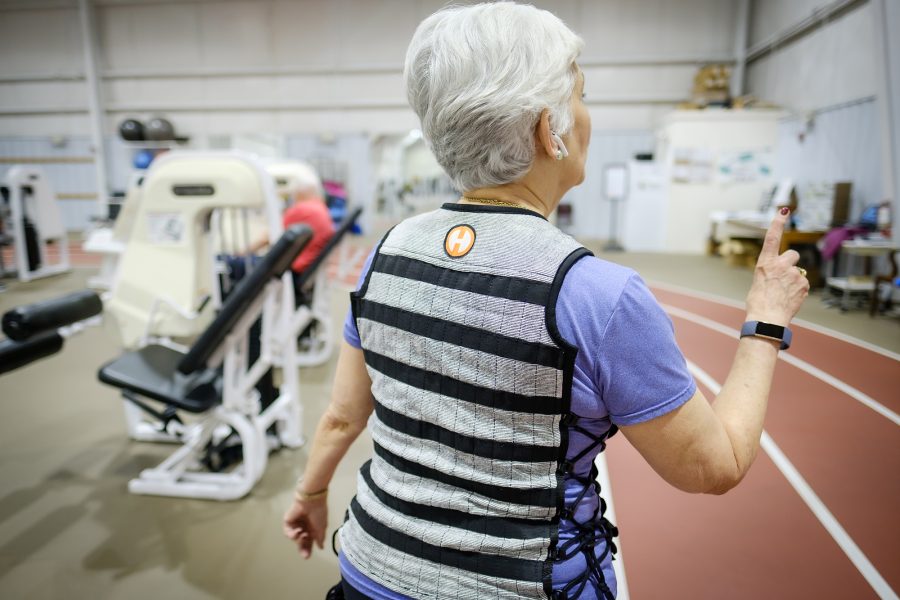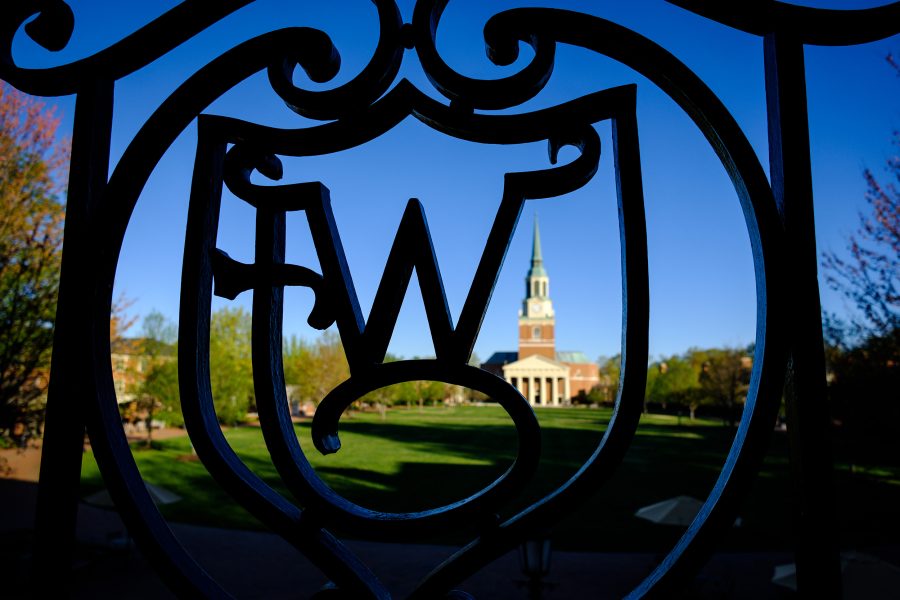Women in science

Professor Rebecca Alexander with Ph.D. student Veronica Casina: Still dealing with the same issue — why women are underrepresented in the sciences — from a century ago.
Despite increasing educational and employment opportunities for women in recent decades, the representation of women in science remains low. Associate Professor of Chemistry Rebecca Alexander and students in her first-year seminar are exploring why “Well-behaved Women Rarely Make Scientific History” and how to make the future brighter for the next generation of female scientists.
Why did you develop this course?
In part it’s selfish. I never learned about many of the women who were early pioneers in science — those who made it possible for women to break through the barriers that existed. So I want to make sure that I know this history and also communicate it to students.
Why are women still underrepresented in science?
That’s the big question at hand! The work-family struggle isn’t unique to women scientists but it makes it hard to persevere through a Ph.D. and subsequent training. It’s difficult to take time off for a family and still be competitive in terms of grant funding or moving up the corporate ladder. There is also the self-perpetuating nature of academia — if the majority of professors (and thus research advisors) are men, where are the role models for young women? Add to this a misconception that it’s not feminine for women to be interested in mathematical and physical sciences and surprisingly, you have the same issues discussed at the turn of the 19th century.
What is the status of women in the science departments at Wake Forest?
Of the 58 chemistry majors, 28 are women, so almost 50 percent. There are five women faculty out of 17, which is fairly high for a chemistry department, and in fact Wake Forest is pretty good in the science departments generally with respect to percentage of women. Nowhere near 50 percent, but no one is.
What makes the first-year seminar a good venue for exploring this topic?
In a small seminar class, there is time and space to reflect and discuss these issues. While I have my biochemistry students get a taste of women’s struggles in science by reading “The Double Helix” (a classic case study!) there isn’t enough time to discuss the topic in science class when we need to get through glycolysis and other topics.
How are the male students responding to the discussions?
They’re learning and asking good questions about the historical context of the issue. For example, women would often take what seems to today’s modern students to be tedious, menial work (in the sciences). One student asked, “Why wouldn’t the women just hold out for better jobs?” But of course in the era we’re reading about (1890s) there weren’t many options, and some women were glad to have any job that used their science training.
As part of the course, you’re having your students work with middle-school students; what will they be doing?
We’ll do simple experiments (making slime, isolating DNA from strawberries) with the middle-school students. We’ll practice them first in class to give the seminar students confidence. I’m hoping that my students will realize that they don’t have to wait until they’re “experts” in a field before they contribute to the community.
What advice do you have for women interested in careers in science?
The best place to start is with a mentored research project. Find a professor whose research is interesting to you and ask to work with them. There are opportunities for research work through a summer fellowship or for credit during the semester. Also, look for summer internships with a pharmaceutical company or national laboratory. The National Science Foundation’s REU (Research Experience for Undergraduates) has summer fellowships at a large number of campuses across the U.S. Finally, talk about your research! The URECA (Undergraduate Research and Creative Activities) Center on campus hosts an Undergraduate Research Symposium during Family Weekend in the fall where students share information about their research with the campus community and their families.
What resources are available for support and networking?
The best resource is a professor who knows your skills and interests, whether it’s your major advisor, a favorite classroom professor or a research mentor. Career Services can also help identify internships and postgraduate opportunities. Be on the lookout for Women in Science meetings during the year. Informal interactions over pizza with faculty and students from a department outside your major can be a great way to get advice and learn about different people’s experience in a science career. Watch for URECA Center activities in the spring and summer. Last year we had an ice cream social and went to a baseball game. This summer we also plan to have sessions on applying to graduate school and finding the right career fit.
What kinds of careers opportunities are available for women who major in chemistry?
There are so many opportunities that might not seem obvious! I have two chemistry-English double majors working in my lab this semester who could have lots of open doors in science writing. Energy-related science will continue to grow, and hopefully the biotech/pharmaceutical industry will rebound before too long. Science is increasingly multinational and while most researchers speak and publish in English, students with international experience and sensibilities will have an advantage.
What do you hope your students will learn from this seminar?
I hope students will develop an appreciation for the women pioneers of science and also become more aware of gender issues in academic and professional life. I hope they will seek out mentors to guide them in their career choices, whether scientific or otherwise. I hope they will see the value of science education and the importance of public funding for research. I hope they will learn about the value of community engagement. Finally, many women scientists (including myself) have had fathers who were either scientists or supported their daughters’ interest in science. So when the guys in my class have daughters, I hope they will encourage kitchen experiments and take them to places like SciWorks.
Categories: Experiential Learning, Research & Discovery, University Announcements
Media Contact
Wake Forest News
media@wfu.edu
336.758.5237



